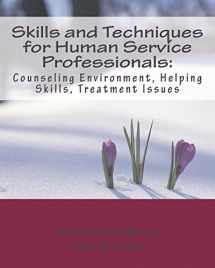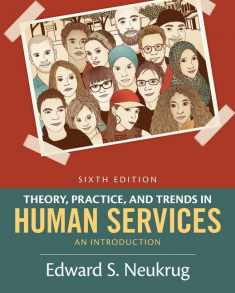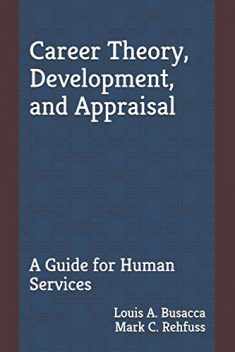
Skills and Techniques for Human Service Professionals: Counseling Environment, Helping Skills, Treatment Issues
Book details
Summary
Description
Skills and Techniques for Human Service Professionals provides helpers with important knowledge in three areas: The counseling environment, helping skills, and treatment issues. SECTION I: THE COUNSELING ENVIRONMENT (Chapters 1-3) 1) Characteristics of the Effective Helper, highlights eight characteristics of the effective helper, including empathy, genuineness, acceptance, cognitive complexity, wellness, competence, cultural sensitivity, and developing your “it factor.” 2) Entering the Agency, reviews agencies should respond to phone calls and emails, the atmosphere created by support staff and surroundings, whether helpers have embraced characteristics of the effective helper, the comfort level of the helper’s office, and nonverbal behaviors of helpers, such as attire, eye contact, body positioning and facial expressions, personal space, touch, voice intonation, and tone of voice. SECTION II: HELPING SKILLS (Chapters 3-7) 3) Foundational Skills, presents skills or attitudes that helpers should provide early in the relationship including honoring and respecting the client, being curious, delimiting power and developing an equal relationship, non-pathologizing the client, and demonstrating the 3 C's: being committed, caring, and courteous. 4) Essential Skills, are core skills used in any helping relationship and often initiate movement toward goal identification and even goal achievement. They include silence and pause time, listening skills, reflecting feelings and content, paraphrasing, and basic empathy. 5) Commonly Used Skills, presents skills often exhibited by helpers, and include affirmation giving, encouragement, and support; offering alternatives, information giving, and advice giving; modeling; self-disclosure; collaboration; and advocacy. 6) Information Gathering and Solution-Focused Questions, distinguishes between information gathering skills, such as open questions, closed questions, tentative questions, and why questions; and solution-focused questions, such as preferred goals questions, evaluative questions, coping questions, exception-seeking questions, and solution-oriented questions. 7) Advanced and Specialized Training, examines advanced empathy; confrontation: challenge with support; interpretation; cognitive-behavioral responses; and specialized training skills in the areas of assessment for lethality: suicidality and homicidality; crisis, disaster, and trauma helping; token economies; positive helping; and coaching. SECTION III: TREATMENT ISSUES (Chapters 8-10) 8) Case Management, reviews issues related to informed consent and professional disclosure statements; assessment for treatment planning; monitoring medications; monitoring progress; writing case notes; ensuring security and confidentiality of records; documenting contact hours; making referrals; conducting follow-up; and practicing time management. 9) Multicultural Counseling, examines how to become culturally competent. It offers eight reasons why counseling has not been helpful for some, identifies definitions and models of culturally competent helping , and examines strategies for working with different ethnic and racial groups; people from diverse religious backgrounds; women; men; lesbians, gays, bisexuals, and transgender individuals; the homeless and the poor; older persons; individuals with mental illness; individuals with disabilities; and substance users and abusers. 10) Ethical Issues and Ethical Decision-Making examines ethical codes, reviews four ethical decision-making models, and presents ethical issues related to informed consent, competence and scope of knowledge, supervision, confidentiality, privileged communication, dual and multiple relationships, sexual relationships with clients, where the helper’s primary obligation lies, continuing education, multicultural counseling, and values in the helping relationship. Ethical vignettes are presented.
Reader reviews


We would LOVE it if you could help us and other readers by reviewing the book
1 - 1 of 1 reviews
Book review





